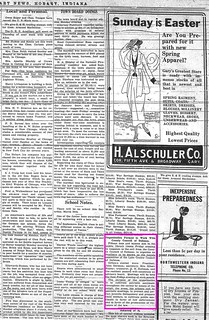
(Click on image to enlarge)
Once again John Dorman came forward in support the civilian war effort, this time to head up the "morals" auxiliary of the Lake County Council of Defense. The goals of the morals committee sound laudable, do they not? — "to cultivate patriotic sentiment throughout the county by means of the pulpit, the press, the schools and by patriotic meetings, to prevent and correct juvenile delinquency and promote child welfare, to cultivate public sentiment in favor of law enforcement and in favor of the prosecution of violators of the law" — so why do they send chills up my spine? I suppose it's because (once again, as we did last October) we're hearing what could be a rehearsal of a Klan sales pitch. And also because I have a sneaking suspicion that by "patriotic sentiment" they meant unquestioning acceptance of the aims and acts of the U.S. government, and of the status quo in general … but that's just a gut feeling, not based on evidence.
The next week, this item came out of Valparaiso:
Outspoken disloyalty in either the Schelling Music hall or the Memorial theater in Valparaiso will not be tolerated hereafter, is the edict of manager E.J. Salisbury, who says anyone hearing remarks of this nature is requested to report the offender, who will be taken to the stage and forced to apologize to the audience, else he will be thrown out bodily into the hands of the policemen.Of course, a private individual has the right to enforce whatever standards of behavior he wants in a private establishment. That doesn't stop this from being creepy. What constituted "outspoken disloyalty," I wonder? — once again, I have only my suspicions, and I suspect it included any suggestion that the U.S. should have stayed out of the European war.
I want to guard against the tendency to judge these people too harshly, since it's very easy for me to sit here safely in 2011, with the luxury of viewing the war as history. I know how soon the war would end and which side was going to win; they didn't. They were barely a year into a war had now gone on nearly four years, at a horrific cost. Their loved ones were in it, or training for it. Their houses were cold and their meals were skimpy. Their money was in Liberty Bonds. They didn't know the rumors were just rumors. And the reality, if they knew it, was scary enough. By the spring of 1918, Russia's internal collapse had ended the fighting on the Eastern Front, freeing up German troops to reinforce the Western Front. Germany was now effectively ruled by a military dictatorship with a single-minded devotion to the war. It still had capable fighters and terrible weapons of destruction on its side.
So these people at home were worried — scared, even; and they had reason. And people who are scared do things that people who are secure should be careful about judging them for.
Sources:
♦ "Local and Personal." Hobart News 4 Apr. 1918.
♦ Meyer, G.J. A World Undone: The Story of the Great War 1914 to 1918. New York: Bantam Dell, 2007.
♦ "Organization Formed to Work With County Council of Defense." Hobart News 28 Mar. 1918.


No comments:
Post a Comment